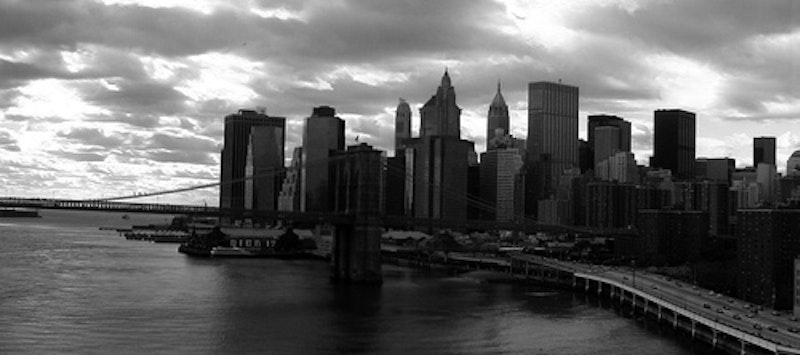Dude comedies have become a staple of the American media diet, though they probably always have been in form or another. Slacker dudes are particularly popular—the successes of Judd Apatow and Seth MacFarlane's most popular fare are evidence enough.
HBO, in its perpetual effort to not be television, has taken this formula and turned it on its head. First with Entourage, a series about making it and staying on top, and now with How to Make It in America, about what happens before you've made it. Our two heroes, Ben (Bryan Greenberg) and Cam (Victor Rasuk) are too guys who are tired of doing nothing, and propose to start a line of designer jeans.
I suspect Ben and Cam will eventually get rich. The series can't sustain itself on poverty and hardship (it's too earnest); still, there's something intriguing about How to Make It in America's emphasis on the less glamorous, or occasionally glamorous New York—as opposed to Sex and the City and its copycats' perpetually glamorous city, or Entourage's Los Angeles. Sure, there are hot girls and gallery openings, even a cameo from John Varvatos, but the tone of the show is a little dour, like New York after The Fall. It's certainly about the increasingly distant American dream and the ridiculous lengths people go through to achieve it. Yet it's also, I suspect, about how the dream is almost just a handshake and a cocktail away.
More than anything, How to Make It is about post-boom New York City. This became very clear in episode two when Ben describes the philosophy behind his denim line to his former fashion professor. He wants to get back to the grit and authenticity of old NYC. "It's inspired by 1970s New York, so you've got the birth of hip hop and the birth of punk rock … just the spirit of the 70s," Ben says. "Were you even alive in the 70s? This place was a dump. Central Park was a war zone. Times Square was full of hookers," the prof retorts. Ben: "What's not to love, right?"
The "real" New York runs through How to Make It, especially in its use of still photographs over various parts of the city, both in its intro and between scenes. Unfortunately, these photos give the show almost all its verve—so far, it's otherwise uninteresting. The photographs give us a sense of place, a grittier, dirtier, darker New York City. Like in Scorsese's Taxi Driver or After Hours.
It's a bit strange, really. What the show’s saying is it's great to be rich and successful in New York, so long as everyone else is suffering. The New York of the 60s, 70s and early 80s, is fantasized and longed for, with its "realness," cheap real estate, empty storefronts and dirty streets. In this fantasy, a poorer New York is a playground. Gone from the discussion are rampant crime and unemployment. This New York is a great place to live, if you're one of the few people to have "made" it. You can buy an enormous apartment, bolt downtown and take in some underground art and music, stopping by Warhol's Factory, Oldenberg's Store, Haring's Shop, seeing Madonna sing and pop back to your loft before you get robbed.
But the truth is if this magical New York reappears, it'll probably be at the expense of our heroes Ben and Cam. Independent luxury brands do not fare well in tough times, ceding ground to more established labels. Phi and Maria Pinto, a Michelle Obama favorite, have both shuttered. Zac Posen apparently isn't doing too well. Even celebrity fashion lines have suffered. There are always successes, of course, but I doubt any investor would give much money to our former slacker dudes in this economy.
The appeal of the old New York, especially to many unemployed men who now populate the rolls, is understandable. Who wouldn't want to see their smug high school colleague turned hedge fund manager down and out and living in New Jersey? But the truth is, if he's forced out of Manhattan, you're living on Staten Island with mom and dad, and there isn't anything less glamorous than it.
How To Make It in America is off to a rough start, lacking the tight plotting of HBO's dramas or sharp dialogue of Entourage and Sex and the City. I suspect the show will improve as Ben and Cam succeed, even if their success is utterly—and disappointingly—a fantasy.

